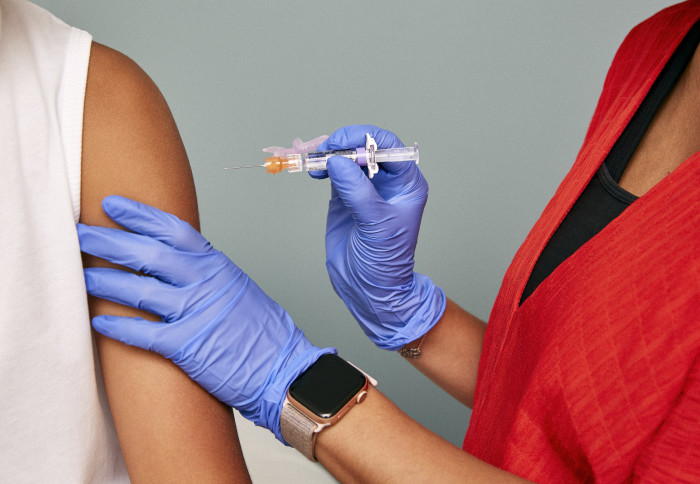Exposure to misinformation could make people refuse a COVID-19 vaccine

Exposure to online misinformation about COVID-19 vaccines could reduce vaccine uptake, threatening the goal of herd immunity.
This is the conclusion of new research, using data from September 2020, showing that fewer people in the UK and US would ‘definitely’ take a COVID-19 vaccine than is required for herd immunity, and misinformation could push these levels further away from that goal.
Akin to following public health guidelines to protect ourselves and each other from COVID-19, it is also important to practice ‘healthy’ sharing of information. Sahil Loomba
The study, published today in Nature Human Behaviour, was led by Imperial College London and the London School of Hygiene & Tropical Medicine. It asked 8,000 people in the UK and US about their willingness to accept a potential COVID-19 vaccine when exposed to misinformation.
Prior to being exposed to misinformation, 54.1% of those surveyed in the UK said they would ‘definitely’ accept a vaccine, 42.5% in the US. After being shown online misinformation, that number dropped by 6.2 percentage points in the UK and by 6.4 percentage points in the US
It is estimated that a COVID-19 vaccine will need to be accepted by at least 55% of the population to provide herd immunity, and some scientists anticipate even higher numbers will be needed. The researchers who conducted the new study say the findings can help inform COVID-19 vaccination messaging and engagement strategies to mitigate the negative impacts of misinformation in the UK and US.
Healthy sharing of information
First author Sahil Loomba, from the Department of Mathematics at Imperial, said: “Expansion of COVID-19 vaccine rollout in various countries, including the UK and the US, is being met with a counterforce of vaccine-related misinformation. Our study suggests that such misinformation bears measurable consequences on someone’s willingness to be vaccinated, which can be especially detrimental if this undermines goals of achieving herd immunity.
“This adds evidence to the call for appropriate action by platforms on which information is shared, such as social media sites and messaging apps.”
The researchers note that scientific-sounding misinformation is more strongly associated with reducing people’s intent. “This should encourage us – the consumers of information – to act responsibly when seeing online content,” added Loomba.
“Akin to following public health guidelines of social distancing and personal hygiene to protect ourselves and each other from COVID-19, it is also important to practice ‘healthy’ sharing of information. We must appreciate the evolving nature of scientific consensus on information related to COVID-19 and check it for reliability and accuracy before sharing with others.”
Crucial vaccines
The research team aimed to quantify the impact of online misinformation on intent to take a COVID-19 vaccine, and identify socio-economic groups that are most susceptible to online misinformation and at risk of non-vaccination.
COVID-19 vaccines will be crucial to helping to end this pandemic and returning our lives to near normal. However, vaccines only work if people take them. Professor Heidi Larson
In the study, conducted in September 2020, 3,000 respondents in each country were asked about their intention to accept a vaccine before and after being exposed to misinformation that was widely circulating on social media between June and August 2020. A further 1,000 were shown information about a COVID-19 vaccine that was factual to serve as a randomised control.
In addition to those who ‘definitely would’ take a vaccine before exposure to information, respondents who said they ‘definitely wouldn’t’ take a vaccine accounted for 6% in the UK and 15% in the US, while those that said they were unsure whether they would take a vaccine but leaned towards yes accounted for around 30% of respondents in both countries.
Study lead Professor Heidi Larson, from the London School of Hygiene & Tropical Medicine, said: “COVID-19 vaccines will be crucial to helping to end this pandemic and returning our lives to near normal. However, vaccines only work if people take them. Misinformation plays into existing anxieties and uncertainty around new vaccines, as well as the new platforms that are being used to develop them. This threatens to undermine the levels of COVD-19 vaccine acceptance required.
“Although studies have examined the effect of COVID-19 misinformation on public perception, the link between exposure to misinformation and intent to receive a vaccination is less well known. This study plugs that knowledge gap.”
Mitigating anxiety
Some groups in the US appear to be more vulnerable to COVID-19 vaccine misinformation, such as women and high-income groups, while Jewish respondents are less susceptible (are more robust) than Christians in the UK.
While there is no evidence that individuals who trust health authorities or scientists are any more or less likely to be impacted by misinformation, trust in non-expert sources seemed to be relevant. In particular, trust in celebrities in the UK is associated with robustness, whereas trust in family and friends in the US is associated with susceptibility to misinformation.
Professor Larson said: “This study can’t replicate a real-world social media platform environment. However, it provides valuable insights for policymakers and stakeholders engaged in either public health communication or the design of vaccine-rollout programme.
“The potential risks of campaigns which aim to propagate vaccine anxiety and doubts through misinformation should not be underestimated. These are serious risks that can undermine optimum uptake of new COVID-19 vaccines.”
-
‘Measuring the impact of COVID-19 vaccine misinformation on vaccination intent in the UK and USA’ by Sahil Loomba, Alexandre de Figueiredo, Simon J. Piatek, Kristen de Graaf and Heidi J. Larson is published in Nature Human Behaviour.
Article text (excluding photos or graphics) © Imperial College London.
Photos and graphics subject to third party copyright used with permission or © Imperial College London.
Reporter
Hayley Dunning
Communications Division